Diving with Snappers
Lanta Marine Life | Lutjaninae
Sister family to the fusiliers, snappers are seen at every dive site during Koh Lanta dive trips, sometimes in very large schools numbering many thousands of fish.
Snappers are a small to large family (from 15 - 20 cm to 1.5 m +) and have a single dorsal fin and two nostrils on either side on their snout.
Some species are planktonic feeders, however most are carnivores, feeding on other fish and crustaceans and have well developed canine-like teeth.
10 species found on this page:
- Bigeye Snapper (Lutjanus lutjanus)
- Checkered Snapper (Lutjanus decussatus)
- Five-lined Snapper (Lutjanus quinquelineatus)
- Two-Spot Snapper (Lutjanus biguttatus)
- One Spot Snapper (Lutjanus monostigma)
- Mangrove Red Snapper (Lutjanus argentimaculatus)
- Blubberlip Snapper (Lutjanus rivulatus)
- Blackspot Snapper (Lutjanus ehrenbergii)
- Brownstripe Snapper (Lutjanus vitta)
- Black and White Snapper (Macolor niger)
Bigeye Snapper
(Lutjanus lutjanus)
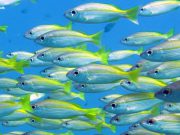
Lutjanus lutjanus @ Koh Bida
The Bigeye Snapper has a generally silvery body with a yellow tinge, and a yellow or yellow-brown stripe from the eye to the tail. Above the stripe are many narrow wavy diagonal lines, and below the stripe are several narrower stripes on the lower body. The fins are pale yellowish, and the gap between the eye and lip is small.
The Bigeye Snapper grows to 30 cm, but usually observed in the 15 cm - 20 cm range. This is a common species, forming huge schools of many thousands of individuals at some dive sites, particularly around Koh Bida Nok and Koh Bida Nai. The diet includes smaller fish and crustaceans.
Checkered Snapper
(Lutjanus decussatus)

Lutjanus decussatus @ Koh Haa
The Checkered Snapper has a whitish body with 5 - 6 horizontal brown stripes and 6 - 7 dark bars across the back, forming a checkered or net-like pattern. The head and face are covered in numerous small spots or freckles. The eye may have a tinge of yellow above it. There is a large black spot on the tail base.
The Checkered Snapper grows to 30 cm, but usually observed around 15 cm - 20 cm. This species can be solitary, but is often seen in small schools. The diet includes smaller fishes and crustaceans.
Five-lined Snapper
(Lutjanus quinquelineatus)
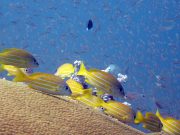
Lutjanus quinquelineatus @ Shark Point
The Five-Lined Snapper has a bright yellow body, with a pale yellow belly and a dusky or reddish face. There are 5 bright blue, roughly equally-spaced horizontal stripes running the length of the body. The lowest stripe borders the pale belly. There may be a dusky or dark smudge or spot on the rear back.
The Five-Lined Snapper grows to 39 cm, but more usually observed in the 15 cm - 20 cm range. This species forms small to medium sized schools at most of the dive sites around Koh Lanta.
Two-Spot Snapper
(Lutjanus biguttatus)
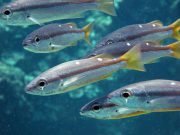
Lutjanus biguttatus @ Koh Haa
The Two-Spot Snapper has a slender body with a brownish grey back with two white spots on each side, a wide reddish brown stripe from the snout to the tail, a white stripe from the mouth to the tail, and a reddish brown belly. There is a white spot on the top of the tail base, making 5 white spots in total.
The Two-Spot Snapper grows to 20 cm, however it is usually observed around the 15 cm range.
This species is common to several of the dive sites around Koh Lanta, occurring in large schools of many 100's and often 1,000's of individuals in areas of Koh Bida Nok, Hin Bida, and the Koh Haa Islands, particularly Koh Haa One. Smaller schools are found at almost every other dive site. The diet includes small fishes and crustaceans.
One Spot Snapper
(Lutjanus monostigma)

Lutjanus monostigma @ Hin Daeng
The One Spot Snapper has a silvery, or yellowish to pinkish silvery body with dusky scale margins and distinctive yellow fins.
The One Spot Snapper has dark eyes and may have a horizontally elongate dusky spot on the rear upper body.
The One Spot Snapper grows to 60 cm and is known locally as the 'Yellow Snapper' due to it's yellow fins.
This species is often solitary or observed in small groups.
The diet includes other fishes, bottom dwelling crustaceans, including crabs at night.
Mangrove Red Snapper
(Lutjanus argentimaculatus)

Lutjanus argentimaculatus @ Koh Haa
The Mangrove Red Snapper has a grey body, with shades of red, green and brown and darkish scale centers. The rear dorsal, anal and tail fins are dusky or darkish, possibly dark reddish.
Juveniles Mangrove Red Snapper are identified by with a series of 8 white bars and 2 blue streaks across the cheeks.
Mangrove Red Snapper grows to 1.5 m in length, but more usually observed in the 50 cm - 80 cm range. This species is an ambush predator, with the diet including other fishes, crustaceans, gastropods, and cephalopods.
Blubberlip Snapper
(Lutjanus rivulatus)
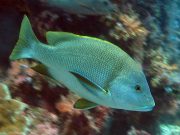
Lutjanus rivulatus @ Koh Haa
The Blubberlip Snapper, also known as the Maori Snapper, has a deep body and much thicker lips that other snapper species.
The scales are pale, with a brownish or reddish border and a bright white or pale blue spot in the middle. The head has many very thin bright blue broken wavy lines.
The Blubberlip Snapper has mostly yellowish to dusky grey-brown fins. The pectoral fin base is yellowish and there is a very faint dusky vertical bar from the pectoral fin base to the top of the head/upper body.
The Blubberlip Snapper grows to 80 cm and is usually seen in groups of 5 - 10 individuals.
Blackspot Snapper
(Lutjanus ehrenbergii)

Lutjanus ehrenbergii @ Hin Klai
The Blackspot Snapper has a whitish or silvery under colour, with a darker silvery grey forehead, upper body and dorsal area.
There are 5 thin yellow stripes on the side of the body, and a large black spot toward the rear body. The tail and anal fins are yellowish.
The Blackspot Snapper grows to 35 cm and is often seen in small groups, sometimes in larger schools.
Usually spotted near the reef edge and over coral rubble and rocky areas close to the reef.
Brownstripe Snapper
(Lutjanus vitta)
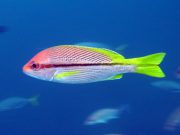
Lutjanus vitta @ Koh Haa
The Brownstripe Snapper has a whitish under colour with diagonal brown lines on the upper body (above the lateral line) and horizontal brown lines on the lower body.
There is a thicker yellowish brown to black stripe from the eye to the base of the tail. The tail, dorsal and anal fins are yellow.
The Brownstripe Snapper grows to 40 cm, and is less common at the dive sites around Koh Lanta.
The diet includes small fishes, shrimps, crabs and other bottom dwelling invertebrates.
Black and White Snapper
(Macolor niger)
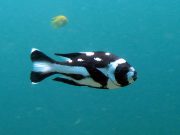
Juvenile Macolor niger @ Koh Rok
The Black and White Snapper adult body colour varies from grey to grey-brown for younger adults to a much darker grey/near black for older adults. Adults have many indistinct blotches and do not have any yellow or blue markings on the head or body. The eye is large and dark.
The Black and White Snapper juvenile body has a distinctive black and white pattern, with white tail fin lobes and white spots on the back.
The adult Black and White Snapper can grow to 75 cm, but usually observed smaller than this. Juveniles are in the range 4 cm - 15 cm and are solitary, however adults may be solitary or form schools., The diet includes crustaceans and small fishes.
Diving with Snappers around Koh Lanta
Scuba Diving & Snorkel Trips
If you'd love a chance to spot Snappers on one of our daily high season diving trips from Koh Lanta then send us an email to info@diveandrelax.com.
Join our high season speedboat dive trips to some of Thailand's best dive sites and enjoy small groups, short journey times, with a focus on great personal service, safety and fun.
Not yet a certified diver? Learn to Scuba Dive on Koh Lanta with the 3 day SSI Open Water Diver course.
Book online to save 10% on dive trips and scuba courses on Koh Lanta.
Find Out More
Indo-Pacific Marine Life Guides
- Allen, G., Steene, R., Humann, P., DeLoach, N. (2003) Reef Fish Identification, Tropical Pacific. Jacksonville, FL., USA: New World Publications, Inc., ISBN 1-878348-36-1.
- Humann, P., DeLoach, N., (2010) Reef Creature Identification, Tropical Pacific. Jacksonville, FL., USA: New World Publications Inc., ISBN 978-1-878348-44-9
- Debelius, H. (2013) Indian Ocean Reef Guide. Frankfurt, Germany: IKAN - Unterwasserarchiv, ISBN 978-3-939767-52-7.
- Debelius, H. (2004) Nudibranchs and Sea Snails, Indo-Pacific Field Guide. Frankfurt, Germany: IKAN - Unterwasserarchiv, ISBN 3-925919-51-1
- Erhardt, H., Knop, D. (2015) Corals Indo-Pacific Field Guide. Frankfurt, Germany: IKAN - Unterwasserarchiv, ISBN 3-925919-69-4.
- Veron J.E.N., Stafford-Smith M.G., Turak E. and DeVantier L.M. (2016). Corals of the World
